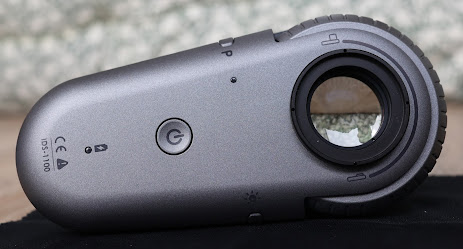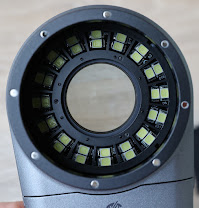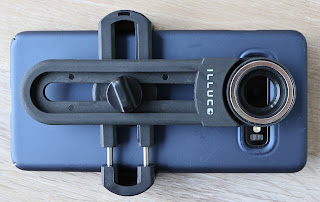Illuco IDS-1100
Introduction
The Illuco IDS-1100 is a Korean made hybrid contact/non contact dermatoscope, meaning it can switch between polarized and unpolarized light.
I purchased the dermatoscope for $724 ($504 plus $60 shipping and $150 Danish sales tax).
My regular dermatoscope is a DermLite DL4W and is $1295 in the US, and $1430 including Danish sales tax.
The IDS-1100 is comparable to the DL4W, feature wise, but the DL4 (left) has a superior build quality and is more compact.
Design
Overall the IDS-1100 feels very well built, if a bit plasticky. Focusing is easy, and toggling between polarized and unpolarized light is intuitive. There are three settings for light intensity. I prefer the medium setting, but the most intense setting may improve photography, by enabling a smaller aperture, or lower ISO, when taking pictures. I have not done such tests yet.
It is a bit annoying that the IDS remembers your last settings, because I always start by using the polarized light. The DL4 defaults to using polarized light, when you turn it on, and you cannot adjust the light intensity. I prefer this, "keep it simple" design.
The IDS-1100 is big, there are no two ways about it, and even though the contact plate is larger, the useful field of view is about the same as on the DL4.
Most of the time, the large size is not an issue, but it can make it more difficult to examine sites such as interdigital spaces.
Special contact plates for nails are available, but not included.
You may notice that the DermLite seems to use identical LEDs, for polarized and non polarized dermoscopy, but with polarization filters over the LEDs used for polarized dermoscopy, whereas the IDS-1100 uses polarized and unpolarized LEDs.
The magnetic ring on the DermLite adapter is a little bit bigger than the Illuco, but it holds the IDS-1100 strongly, and is easy to center.
When using the DermLite adapter, the dermatoscope can slide a little bit, but I don't feel that is a real issue.
Special contact plates for nails are available, but not included.
Looking at the LEDs, without the contact plate, shows how much space is taken up by the light source, and focusing mechanism. The contact plate is held magnetically. There has been some talk of that being a risk when examining patients with pacemakers, but the actual physics make that highly unlikely. The contact plate on the DL4W snaps on instead of using magnets.
Polarized and unpolarized modes on the IDS-1100
Polarized and unpolarized modes on the DL4W
The light from the DL4W (left) is warmer and more natural, whereas the light from the IDS-1100 (right) is more cold. I don't think this makes much of a clinical difference, but I find the DL4W more pleasing.
In the box
The IDS-1100 comes with a pouch, a good quality USB to Micro-USB charging cable, some alcohol whipes and a piece of cloth. No charger is included.
Accessories
Check out Illuco's website for all the options: https://illuco.co.kr/Dermatoscope_IDS-1100
I purchased a universal adapter ($60), but adapters exist for most iPhones and Samsung Galaxy Phones.
Personally I prefer using a cover-adapter for for a smartphone, and I use one for a Samsung Galaxy S8, with my DL4 in my office.
The S8 has a great camera and is now very cheap to purchase used, so I don't have to use my personal phone.
The Illuco Universal adapter is fine, but it drifts easily, so you may need to adjust it between use.
Fortunately I found that the IDS-1100 is compatible with DermLite's adapters, but the DL4 is NOT compatible with the Illuco adapter though.
The original adapter fits more snugly, but cannot hold a DermLite.
The DermLite Universal Adapter works better than the original one IMO
When using the DermLite adapter, the dermatoscope can slide a little bit, but I don't feel that is a real issue.
DermLite makes a lot of great adapters, like this one for a Samsung Galaxy S8. It being compatible with the Illuco is practical if you were to use both brands.
Like with the DL4W, and other DermLites, the magnetic attachment is very strong and practical.
Conclusion
There is no doubt that the DermLite DL4W is the better dermatoscope, but at almost half the price, you really can't go wrong with the IDS.
Pros
Cheap compared to the competition
Good optical and built quality
Polarized and unpolarized modes
Contact and non contact capable
Multiple adapters and accessories
Compatible with DermLite adapters, but use at your own risk
Charges via USB (micro-USB)
Cons
Much larger than the DL4, without any real benefit
Light is a bit cold and unnatural
Does not use USB-C

























